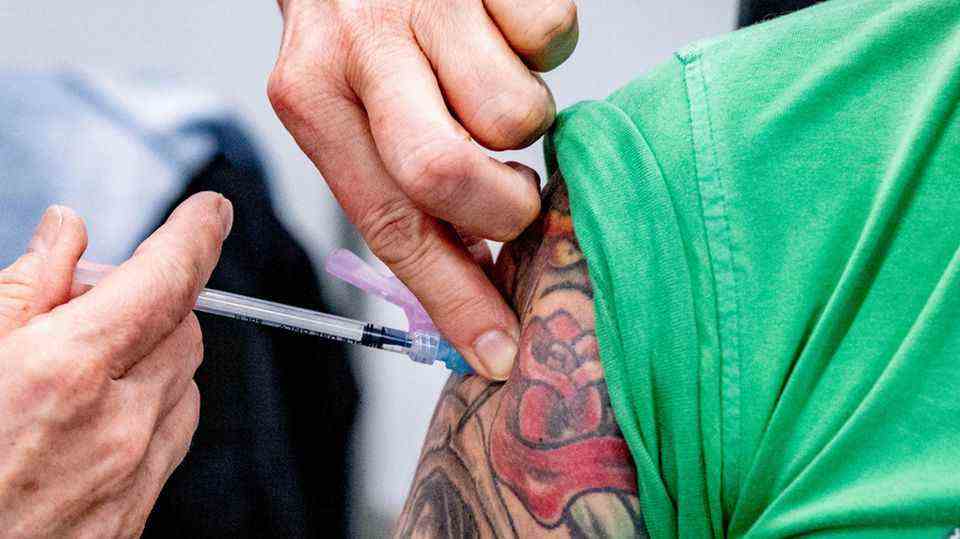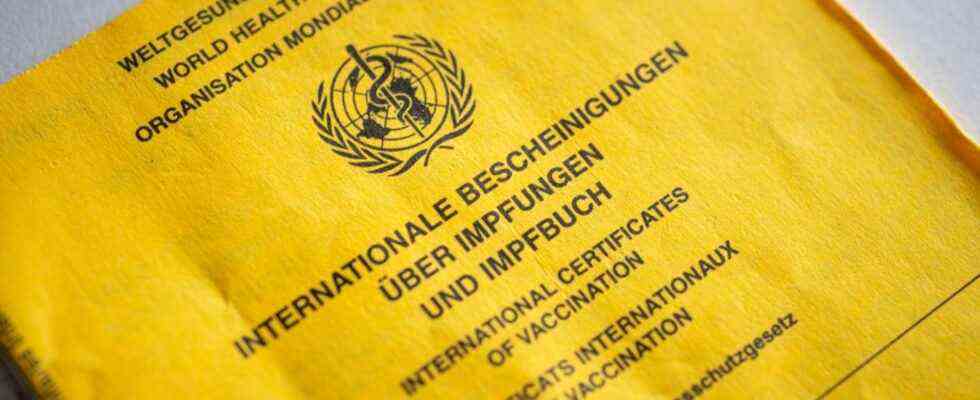Until (or if) vaccination becomes mandatory, it will be very complicated – politically, ethically, legally. Because the question of whether employers are allowed to know about the vaccination status of their employees is already causing headaches. An attempt at an explanation.
With the orientation debate on a general corona vaccination obligation, the members of the Bundestag officially got the discussion rolling on what is probably the most controversial, emotional and ethically and legally most complicated question since the beginning of the pandemic. Although a recent survey by the “ZDF political barometer“According to 62 percent of those eligible to vote, a large part of the population is still in favor of mandatory immunization.
But it’s not just a matter of if, but also of how. For which age group should vaccinations apply? Who controls compliance? What are the penalties for the ignorant? All of this should cause plenty of bickering in the coming weeks – on and off Republic Square.
How incredibly tedious this debate is likely to be can be seen from a supposedly simple question: Can an employer require their employees to disclose their vaccination status? A detour into the jungle of data protection and labor law.
Obligation to provide information today: a frayed patchwork quilt
But from the front. According to the current legal situation, the so-called obligation to provide information, i.e. the mandatory disclosure of the vaccination status, only applies to employees in certain institutions and companies according to the Infection Protection Act. These include kindergartens and schools, inpatient and outpatient care services as well as shelters for the homeless and asylum seekers. In addition, there are medical facilities – i.e. mainly hospitals. Sense and purpose are obvious: particularly threatened, or “vulnerable” people, as the law says, should be protected from the virus.
However, this does not (yet) mean that people who have not been vaccinated are not allowed to work in these areas – so far a negative test is sufficient here. Of course, not only doctors and educators work in hospitals and kindergartens – cleaning staff, caretakers and canteen workers also come and go here every day. However, the same rules apply to them – after all, these employees also have potential contact with people who are at risk.
For all other employees who cannot or do not want to work from home, only the 3G rule applies at work. You must present at least one recent, negative test when entering the company. Employees can voluntarily enter their vaccination status. However, there is no obligation to provide information here.
So easy? Of course not. Because at this point you can’t avoid the popular “patchwork quilt”. The federal states grant companies different far-reaching rights when it comes to asking about the vaccination status of their employees, explains Marc André Gimmy, specialist lawyer for labor law and chairman of the committee for labor law of the Federal Bar Association in an interview with the star. In the end, the only thing that helps is a tiresome look at the respective Corona Protection Ordinance. “It’s insane: this jumble of rules can no longer be explained to a normal employee. This is above all the result of catastrophic communication,” criticizes the lawyer.
What can unvaccinated workers expect in quarantine?
And then there are the exceptional regulations in connection with continued payment of wages in the event of quarantine: since November 1, 2021, unvaccinated employees who have to go into quarantine as contact persons have no right to compensation. They also do not receive continued payment of wages “since they are not unable to work because they are ill,” says Gimmy.
The situation is different if an unvaccinated employee is actually and demonstrably infected with the virus. In this case – as with any other illness – he is unable to work and has the usual entitlement to continued payment of wages for up to six weeks. But what happens if an unvaccinated employee is infected with Corona but has no or only mild symptoms? In most cases, he still receives continued pay, explains Gimmy. However, there is no specific case law on this.
As always, the devil is in the details. In general, it can be said that if an employee is infected, the employer has the right to query the vaccination status – after all, he has to check the compensation claims.
In these countries, the corona measures are relaxed
6 images
Facility-related vaccination requirements: a backflip?
So much for the (vaccination) status quo. Now, however, March 16 is getting closer – and with it the start of the so-called facility-related compulsory vaccination. From then on, all employees in nursing and medical professions must have recovered or been vaccinated. If you don’t sprint, you risk losing your job in the final instance. That’s the theory.
The whole thing was decided by the Bundestag and Bundesrat on December 10 last year. According to this, unvaccinated employees in medical areas had around three months to vaccinate themselves completely – i.e. twice. Actually, everyone who has not been vaccinated to date has had enough time to make a change of heart. “However, from a practical point of view, the fact should not be underestimated that there are more illnesses in the winter months that can prevent the people affected from getting a vaccination appointment. In addition, there was the Christmas season in December with many public holidays, on which the willingness to vaccinate tends to decrease Therefore, the implementation of a full vaccination in practice often takes longer than three months, “specialist lawyer Gimmy points out.
Whether unvaccinated workers are actually no longer allowed to work after the deadline is a completely different matter anyway. Because in the end, the responsible health authority has to examine each of these cases individually. It is therefore not surprising that a spokesman for the health department indirectly rowed back on Tuesday: “Until the health department has made a decision on a ban on entry or activity, the employees concerned may continue to be employed.” The health authorities assume that the vaccination status of five to ten percent of the employees is unclear, said Elke Bruns-Philipps, deputy chairwoman of the Federal Association of Doctors in the Public Health Service to the “Rheinische Post”. Now each of these cases would have to be checked individually by the health department. That’s dragging.
“It was simply determined that the whole thing is not feasible, because the authorities naturally think to themselves: ‘Do you still have all the cups in the cupboard?! What else should we do?'” says Gimmy. And of course the hospitals and nursing homes would also be afraid that their employees would rather quit than get vaccinated. In fact, according to the Federal Employment Agency, around 25,000 more people from the health and social sector registered as job seekers than usual in December and January – around 12,000 of them from care.

Quite apart from that, the employer is usually not qualified to carry out a precise check of the vaccination status – only specialists can do that, says lawyer Gimmy. Because: If an employee in the medical field refuses to be vaccinated after March 16th, in the worst case there is a risk of a ban on employment. This can have far-reaching consequences: On the one hand, logically, he does not receive a salary. On the other hand, he probably doesn’t get any unemployment benefits either – after all, he is still formally employed. “The legislature should have thought this through to the end,” Gimmy points out.
Data versus infection protection
Almost forgot: What about data protection? After all, the vaccination status is extremely sensitive and therefore particularly protected information. In the pre-corona era, such questions would have been inadmissible – because health data is primarily a private matter. But as always, exceptions are the rule. In special cases (e.g. pilots), employers may require their employees to provide a medical certificate – which in turn is always prepared by a specialist and never contains personal information. “Then it’s just: XY is suitable – or not,” explains Gimmy. In summary: An employer may only request health data if it is absolutely necessary for the performance of a job – and even then only rudimentary. Passing on specific information is taboo.
Back to the present. In the context of infection protection, it is one thing if the employer knows about the vaccination status of its employees, according to Gimmy. In the case of compulsory vaccination, this is even a prerequisite for “fulfilment of the employment relationship”. It would be a completely different matter, however, if a company were to pass this data on to third parties – i.e. to the health department. According to the lawyer, this should still cause a lot of headaches from a constitutional and data protection point of view. Because whether a corona vaccination is necessary outside of medical facilities so that employees can do their job is at least debatable.
The world of work in times of compulsory vaccination: a look into the crystal ball
Which rules will apply in the workplace in the coming months will depend primarily on whether general vaccination will be decided at all, and if so, which groups it will affect and to what extent. Legal expert Gimmy is certain that if a strict obligation to vaccinate comes into force, unvaccinated employees would simply not be able to work. “Therefore, there are already considerable doubts under labor law as to whether a general obligation to vaccinate can be implemented at all,” said the lawyer. If unvaccinated employees were released or dismissed as part of a general obligation to vaccinate, the resulting loss of earnings for the company must also be taken into account, for example. Because: If employers are unable to carry out orders because they suddenly find themselves in a shortage of staff, customers could also make claims for damages. Gimmy also fears that the government will shift some of the responsibility for control to companies: “To be honest, it would be unreasonable for employers to have to check the vaccination status of their employees. That’s not their job, it’s that of the authorities! “
This was only a (brief!) insight into the jungle of employment law. However, before a general obligation to vaccinate comes into force, there are still mammoth ethical, political and constitutional tasks ahead. “I’m a specialist lawyer for employment law – and it’s already really difficult for me to keep track of things,” Gimmy sums up. What the world of work could look like in times of mandatory vaccination remains a look into the crystal ball. And it’s pretty milky.
sources: German Infection Protection Act, Federal Ministry of Health; German Trade Union Confederation; with material from the news agencies DPA and AFP

